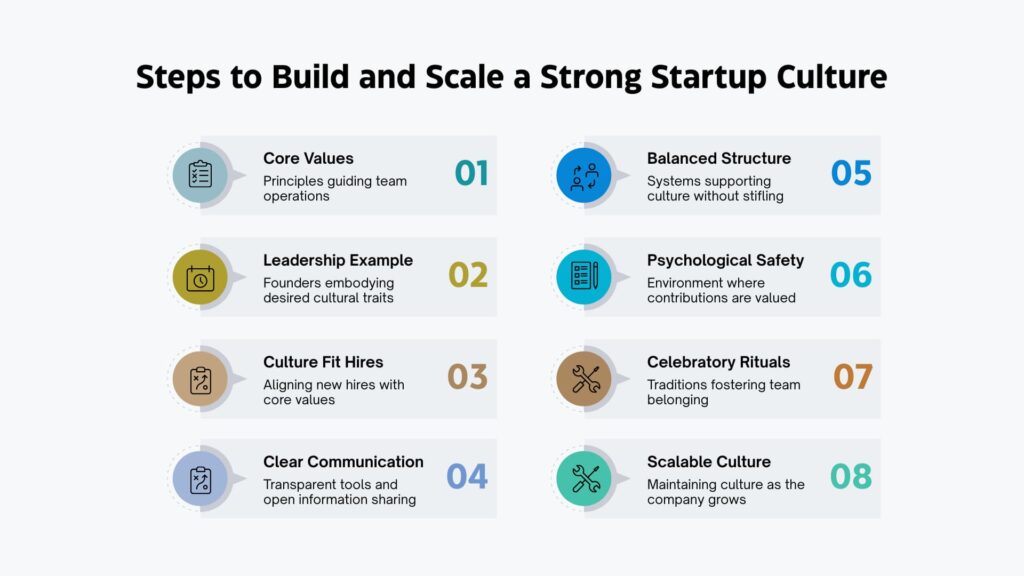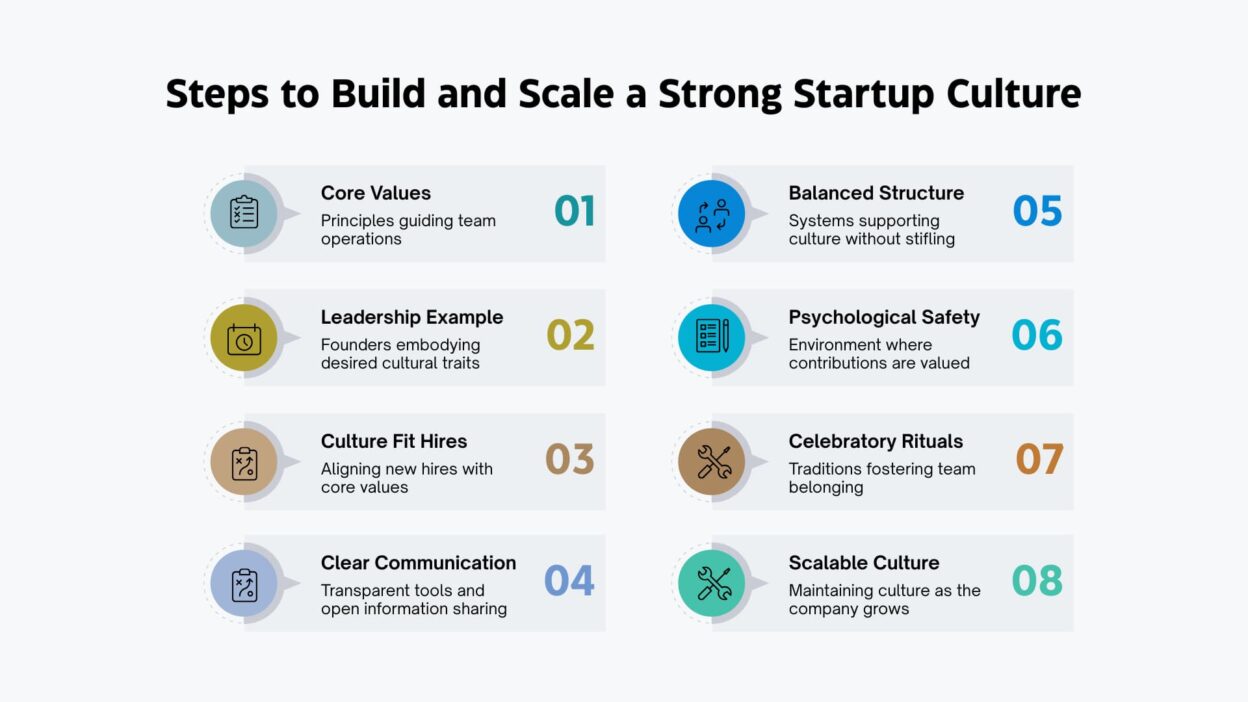When most founders dream about their startup, they picture breakthrough ideas, rapid growth, and big wins. But there’s one element that often gets overlooked in the rush to launch: startup culture.
Your culture isn’t just about fun perks, casual dress codes, or motivational posters—it’s the DNA of your company. It shapes how your team works together, makes decisions, handles challenges, and scales. A strong culture can accelerate growth, while a weak or neglected culture can quietly sabotage your efforts.
So, how can you build a scalable startup culture right from the start, rather than scrambling to fix it later?
Let’s dive into the mindset, strategies, and practical steps that will help your startup thrive today and in the future.
Why Startup Culture Matters from Day One
When you’re small, it might seem like culture can wait. After all, you’re focused on building a product, finding customers, and raising funds. But here’s the truth:
- Culture forms whether you design it or not. If you don’t set values and practices intentionally, they’ll develop organically—and not always in ways that serve your vision.
- Culture attracts (or repels) talent. Early hires shape your startup’s DNA. People don’t just join for salaries; they join because they believe in the mission and vibe.
- Culture drives decision-making. A strong culture provides a shared framework, so teams don’t get stuck in endless debates.
- Culture is scalable glue. As you grow from 5 to 50 to 500 employees, culture is what keeps everyone aligned and motivated.
Steps to Build and Scale a Strong Startup Culture

Step 1: Define Your Core Values Early
Your culture starts with values—the principles that guide how you work. These aren’t fluffy slogans; they’re practical rules for how your team operates.
Tips for Defining Values:
- Make them authentic. Don’t copy Silicon Valley buzzwords. Choose values that reflect who you are and who you want to become.
- Keep them actionable. A value like “integrity” is too vague. Instead, phrase it as: “We do the right thing, even when it’s hard.”
- Limit to 4–6 values. Too many and people forget them. Too few and they’re not meaningful.
- Involve your team. Even if you’re just a handful of people, get input. Buy-in matters.
Step 2: Lead by Example
In the early days, you are the culture. If founders say one thing but do another, employees will follow actions, not words.
- If you want a collaborative culture, collaborate.
- If you want a learning culture, admit your mistakes openly.
- If you want a customer-first mindset, take customer calls yourself.
Step 3: Hire for Culture Fit and Culture Add
Your early hires will define the DNA of your startup for years. Skills matter, but so does alignment with values.
Hiring Tips:
- Look beyond resumes. Ask questions like: “What kind of environment helps you do your best work?”
- Test for values alignment. If transparency is a core value, see how candidates handle constructive feedback.
- Think ‘culture add.’ Don’t just clone yourself. Diversity of perspectives strengthens culture when aligned with shared values.
- Prioritize attitude and adaptability. Startups change fast—you need people who can roll with it.
Step 4: Communicate Clearly and Consistently
In a small team, everyone wears multiple hats. Without clear communication, chaos creeps in.
- Use transparent tools. Platforms like Slack, Notion, or Asana keep information accessible.
- Default to openness. Share updates, successes, and failures. It builds trust.
- Encourage feedback loops. Create safe spaces for employees to speak up.
- Tell your story often. Remind your team why you exist and where you’re going.
Step 5: Balance Flexibility with Structure
Early startups thrive on flexibility—but scaling requires structure. The trick is to build systems that support, not stifle, culture.
- Document your culture. Write down your values, rituals, and practices in a “culture handbook.”
- Create lightweight processes. Don’t over-engineer, but do set clear guidelines for decision-making, hiring, and communication.
- Evolve intentionally. As you grow, revisit your values and systems. What worked at 5 people may not at 50.
Step 6: Foster Psychological Safety
A scalable culture isn’t just about productivity—it’s about people feeling safe to contribute. Google’s Project Aristotle found psychological safety to be the #1 factor of high-performing teams.
How to build it:
- Encourage questions without judgment.
- Celebrate experiments—even failed ones.
- Train leaders to listen more than they talk.
- Recognize contributions openly.
Step 7: Celebrate Wins and Rituals
Rituals make culture tangible. Whether it’s weekly demos, Friday shoutouts, or monthly team retrospectives, small traditions build belonging.
- Celebrate progress, not just milestones. Acknowledge small wins.
- Create shared rituals. These might be team lunches, book clubs, or hackathons.
- Keep it human. A startup is stressful—rituals help maintain energy and connection.
Step 8: Scale Without Dilution
The hardest part of culture is scaling it without watering it down. As you grow:
- Onboard with culture in mind. Teach new hires not just what the company does, but how it works.
- Promote culture champions. Elevate people who embody your values into leadership roles.
- Measure cultural health. Use surveys, one-on-ones, or pulse checks to catch issues early.
- Stay vigilant. Toxic behaviors can spread fast—address them directly.
Common Culture Pitfalls (and How to Avoid Them)
- Culture by default, not design. Fix: Define values early.
- Perks over purpose. Fix: Focus on mission, not free snacks.
- Founder blind spots. Fix: Seek feedback and stay humble.
- Ignoring diversity. Fix: Hire inclusively and welcome different voices.
- Scaling too fast without structure. Fix: Balance agility with systems.
Real-World Examples of Scalable Startup Culture
- Airbnb: Built around “belonging,” their culture emphasized hospitality and inclusion, which scaled globally.
- Stripe: Obsessed with craftsmanship and customer focus, they maintained high standards as they grew.
- Basecamp: Valued calm, sustainable work, rejecting hustle culture while still thriving.
The Long-Term Payoff
Building a scalable culture from day one is hard work, but the payoff is huge:
- Attract and retain top talent.
- Accelerate decision-making.
- Build resilience during crises.
- Increase customer trust.
- Sustain growth without burning out.
Final Thoughts
Startups often think culture is something they’ll “get to later.” But in reality, it’s one of the few things you can’t afford to ignore. From the first hire to the first hundred, culture shapes everything—how you build, how you grow, and how you endure.
If you want your startup to scale successfully, start small but think big. Define values, lead by example, hire intentionally, and build systems that evolve with you.
Remember: products pivot, markets shift, and business models adapt. But a strong culture? That’s what carries your startup through every stage of growth.




